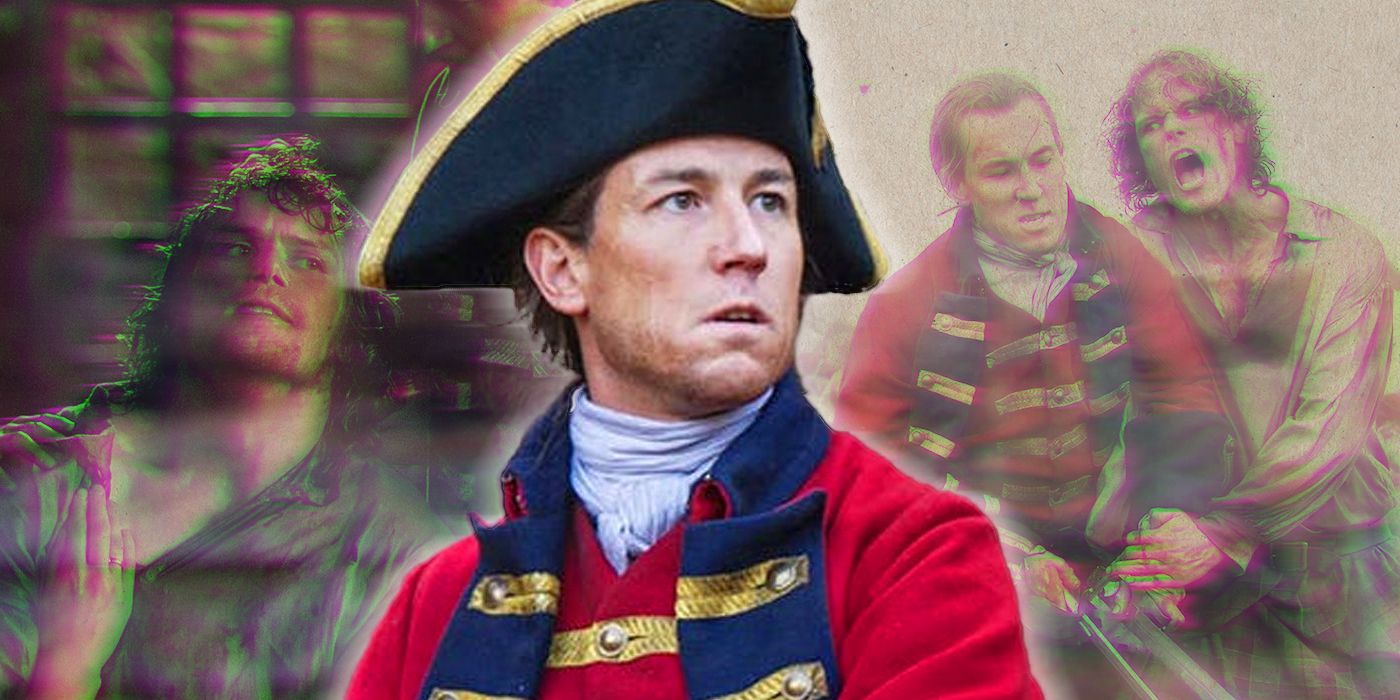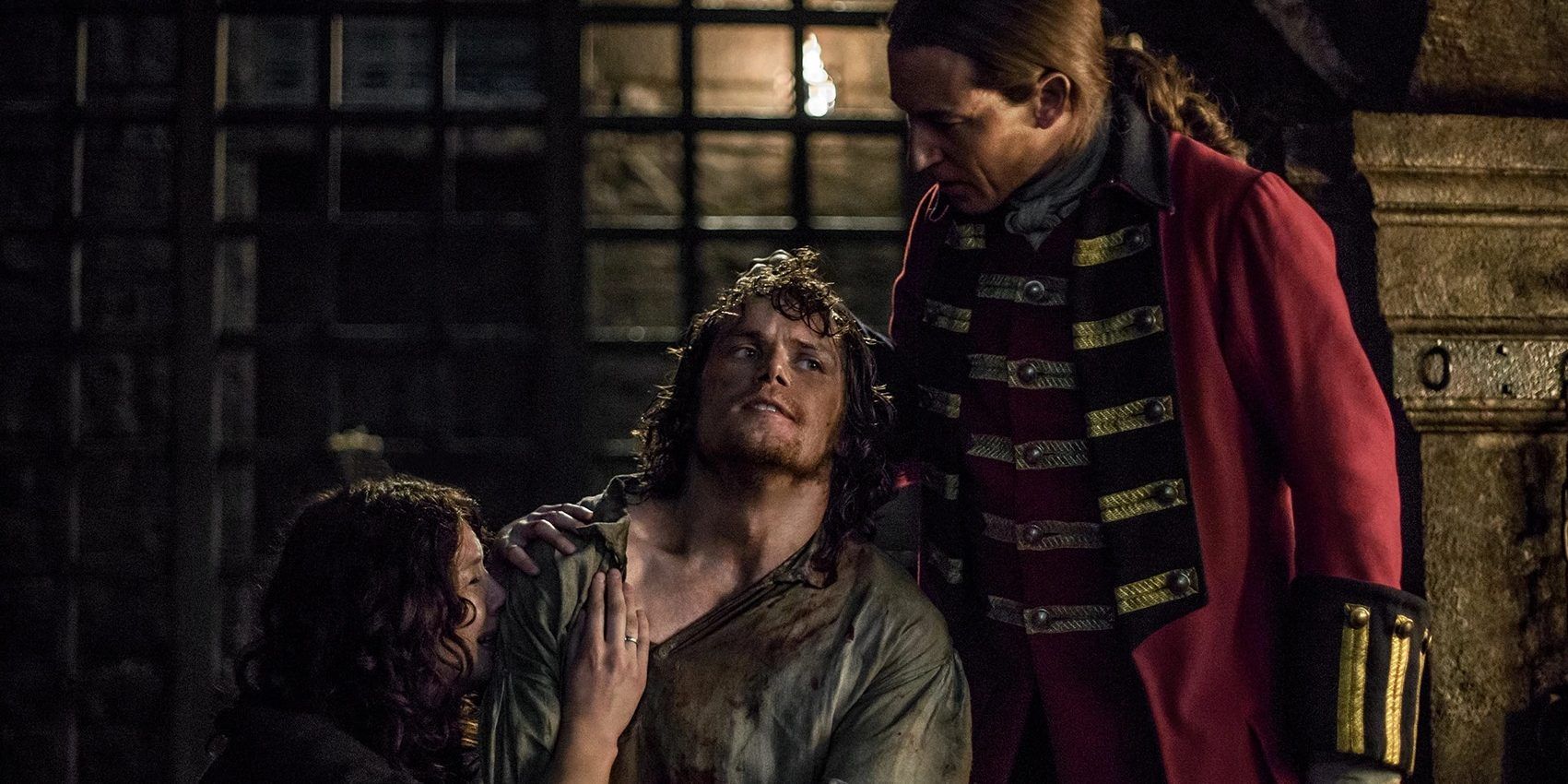Diana Gabaldon's Outlander series has been widely praised for its time-traveling romance between Claire Beauchamp and Jamie Fraser. However, the book series -- which has also been adapted for TV via Starz -- has some glaring flaws. Perhaps most prominent is the positioning of Captain Jack Randall, a queer man, as a violent and predatory villain who haunts the characters for years.
Outlander begins in the year 1945, when former combat nurse Claire Randall touches a stone at Craigh na Dun while on a second honeymoon with her husband, Frank, and is swept through time to the year 1743. There, she encounters her husband's direct ancestor, Jack Randall -- and quickly learns that he isn't the upstanding man Frank believes him to be.
In their first encounter, Jack Randall attempts to rape Claire when she stumbles upon him in the woods, wearing a 1945-appropriate dress (which resembles little more than a shift in 18th century fashion). He's foiled when Murtagh Fitzgibbons, an ally of the MacKenzie clan, knocks him out and takes Claire to a rebel hideaway. She becomes a "guest" of the MacKenzie clan and is eventually married to Jamie Fraser in order to protect her from Captain Randall -- who's more well-known among the Highlanders as Black Jack.
Early in the series, Jamie tells Claire that he was lashed by Randall multiple times in the course of a single week, seemingly because he fought back against the redcoats when they showed up at his ancestral home unannounced. Black Jack attempted to rape Jamie's sister, Jenny, but she saved herself by mocking him outright.
In the meantime, Jamie was arrested and whipped to within an inch of his life. Before his second lashing, Black Jack offered him a deal: If Jamie would "give over" his body to Jack Randall, there would be no second lashing. Jamie refused to become a sexual object for Randall and was flogged again.
Eventually, Jamie escaped from prison, though he became a wanted man when Randall shot one of his own soldiers and blamed the murder on Jamie. When he meets Claire, there's a price on his head that's equivalent to a year of wages for any farmer in the area, so Jamie is using a fake name and generally trying to hide out at Castle Leoch. Unfortunately, Jack's newfound obsession with hurting Claire means Jamie is placed right back in his sights.
The first Outlander book and the first season of the TV show repeatedly push Jamie and Claire into Jack Randall's clutches. They manage to escape mostly unscathed in all but one case, when Jamie sacrifices his bodily autonomy to save Claire's life. His rape at the hands of Black Jack Randall is lengthy and brutal; it affects every part of his life, from his physical abilities to his mental and emotional health. His relationships suffer and he struggles with nightmares and flashbacks, as well as intense triggers.
When Jamie learns Jack Randall is still alive, he's thrilled, because it means he can exact revenge on the man who quite literally tore him apart. However, Claire begs him to wait at least a year, until the day of Jack Randall's death as recorded in the history books her first husband, Frank, has practically memorized. Her fear is that killing Jack too early will mean Frank never exists. Against his better judgment, Jamie agrees, but he breaks that promise when Randall goes after his adopted son, Fergus. Eventually, Jamie kills Jack Randall on the battlefield at Culloden. It doesn't bring him the peace he wants, but it still provides some kind of catharsis.
Black Jack Randall is a violent serial rapist who literally brands his victims with his initials after he "claims" them. He's a compelling villain, especially given the complexities of his ties to both Jamie and Claire, in the 18th century and in the 20th. Actor Tobias Menzies does a phenomenal job portraying two men -- Frank and Jack -- with the same face, but entirely different demeanors, moral compasses and relationships.
However, Jack Randall is one of just two queer characters in Outlander. Positioning him as a predator reinforces incredibly harmful stereotypes about queer men, who are vilified merely for existing. In the 1980s, the U.S. government refused to do anything about the AIDS crisis because conservative leaders believed it was righteous punishment for gay men. To this day, sexually active queer men living in the U.S. cannot donate blood and queer men are often accused of predation, grooming and pedophilia.
Gabaldon could have set up Black Jack Randall as the main Outlander villain without making him a predatory queer man, and the series would be significantly better for it. Instead, she reinforces harmful stereotypes and undermines the effectiveness and beauty of the entire story as a result.


